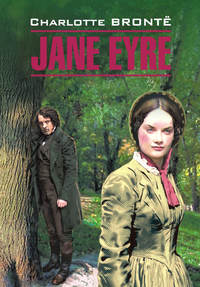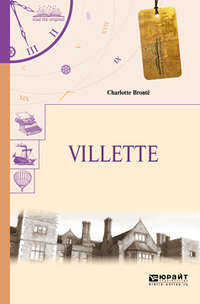 полная версия
полная версияVillette
"Poor Jacob!" she would sometimes say, with quivering lips. "How he loved his son Joseph! As much," she once added – "as much, Graham, as I love you: if you were to die" (and she re-opened the book, sought the verse, and read), "I should refuse to be comforted, and go down into the grave to you mourning."
With these words she gathered Graham in her little arms, drawing his long-tressed head towards her. The action, I remember, struck me as strangely rash; exciting the feeling one might experience on seeing an animal dangerous by nature, and but half-tamed by art, too heedlessly fondled. Not that I feared Graham would hurt, or very roughly check her; but I thought she ran risk of incurring such a careless, impatient repulse, as would be worse almost to her than a blow. On the whole, however, these demonstrations were borne passively: sometimes even a sort of complacent wonder at her earnest partiality would smile not unkindly in his eyes. Once he said: – "You like me almost as well as if you were my little sister, Polly."
"Oh! I do like you," said she; "I do like you very much."
I was not long allowed the amusement of this study of character. She had scarcely been at Bretton two months, when a letter came from Mr. Home, signifying that he was now settled amongst his maternal kinsfolk on the Continent; that, as England was become wholly distasteful to him, he had no thoughts of returning hither, perhaps, for years; and that he wished his little girl to join him immediately.
"I wonder how she will take this news?" said Mrs. Bretton, when she had read the letter. I wondered, too, and I took upon myself to communicate it.
Repairing to the drawing-room – in which calm and decorated apartment she was fond of being alone, and where she could be implicitly trusted, for she fingered nothing, or rather soiled nothing she fingered – I found her seated, like a little Odalisque, on a couch, half shaded by the drooping draperies of the window near. She seemed happy; all her appliances for occupation were about her; the white wood workbox, a shred or two of muslin, an end or two of ribbon collected for conversion into doll-millinery. The doll, duly night-capped and night-gowned, lay in its cradle; she was rocking it to sleep, with an air of the most perfect faith in its possession of sentient and somnolent faculties; her eyes, at the same time, being engaged with a picture-book, which lay open on her lap.
"Miss Snowe," said she in a whisper, "this is a wonderful book. Candace" (the doll, christened by Graham; for, indeed, its begrimed complexion gave it much of an Ethiopian aspect) – "Candace is asleep now, and I may tell you about it; only we must both speak low, lest she should waken. This book was given me by Graham; it tells about distant countries, a long, long way from England, which no traveller can reach without sailing thousands of miles over the sea. Wild men live in these countries, Miss Snowe, who wear clothes different from ours: indeed, some of them wear scarcely any clothes, for the sake of being cool, you know; for they have very hot weather. Here is a picture of thousands gathered in a desolate place – a plain, spread with sand – round a man in black, – a good, good Englishman – a missionary, who is preaching to them under a palm-tree." (She showed a little coloured cut to that effect.) "And here are pictures" (she went on) "more stranger" (grammar was occasionally forgotten) "than that. There is the wonderful Great Wall of China; here is a Chinese lady, with a foot littler than mine. There is a wild horse of Tartary; and here, most strange of all – is a land of ice and snow, without green fields, woods, or gardens. In this land, they found some mammoth bones: there are no mammoths now. You don't know what it was; but I can tell you, because Graham told me. A mighty, goblin creature, as high as this room, and as long as the hall; but not a fierce, flesh-eating thing, Graham thinks. He believes, if I met one in a forest, it would not kill me, unless I came quite in its way; when it would trample me down amongst the bushes, as I might tread on a grasshopper in a hayfield without knowing it."
Thus she rambled on.
"Polly," I interrupted, "should you like to travel?"
"Not just yet," was the prudent answer; "but perhaps in twenty years, when I am grown a woman, as tall as Mrs. Bretton, I may travel with Graham. We intend going to Switzerland, and climbing Mount Blanck; and some day we shall sail over to South America, and walk to the top of Kim-kim-borazo."
"But how would you like to travel now, if your papa was with you?"
Her reply – not given till after a pause – evinced one of those unexpected turns of temper peculiar to her.
"Where is the good of talking in that silly way?" said she. "Why do you mention papa? What is papa to you? I was just beginning to be happy, and not think about him so much; and there it will be all to do over again!"
Her lip trembled. I hastened to disclose the fact of a letter having been received, and to mention the directions given that she and Harriet should immediately rejoin this dear papa. "Now, Polly, are you not glad?" I added.
She made no answer. She dropped her book and ceased to rock her doll; she gazed at me with gravity and earnestness.
"Shall not you like to go to papa?"
"Of course," she said at last in that trenchant manner she usually employed in speaking to me; and which was quite different from that she used with Mrs. Bretton, and different again from the one dedicated to Graham. I wished to ascertain more of what she thought but no: she would converse no more. Hastening to Mrs. Bretton, she questioned her, and received the confirmation of my news. The weight and importance of these tidings kept her perfectly serious the whole day. In the evening, at the moment Graham's entrance was heard below, I found her at my side. She began to arrange a locket-ribbon about my neck, she displaced and replaced the comb in my hair; while thus busied, Graham entered.
"Tell him by-and-by," she whispered; "tell him I am going."
In the course of tea-time I made the desired communication. Graham, it chanced, was at that time greatly preoccupied about some school-prize, for which he was competing. The news had to be told twice before it took proper hold of his attention, and even then he dwelt on it but momently.
"Polly going? What a pity! Dear little Mousie, I shall be sorry to lose her: she must come to us again, mamma."
And hastily swallowing his tea, he took a candle and a small table to himself and his books, and was soon buried in study.
"Little Mousie" crept to his side, and lay down on the carpet at his feet, her face to the floor; mute and motionless she kept that post and position till bed-time. Once I saw Graham – wholly unconscious of her proximity – push her with his restless foot. She receded an inch or two. A minute after one little hand stole out from beneath her face, to which it had been pressed, and softly caressed the heedless foot. When summoned by her nurse she rose and departed very obediently, having bid us all a subdued good-night.
I will not say that I dreaded going to bed, an hour later; yet I certainly went with an unquiet anticipation that I should find that child in no peaceful sleep. The forewarning of my instinct was but fulfilled, when I discovered her, all cold and vigilant, perched like a white bird on the outside of the bed. I scarcely knew how to accost her; she was not to be managed like another child. She, however, accosted me. As I closed the door, and put the light on the dressing-table, she turned to me with these words: – "I cannot —cannot sleep; and in this way I cannot —cannot live!"
I asked what ailed her.
"Dedful miz-er-y!" said she, with her piteous lisp.
"Shall I call Mrs. Bretton?"
"That is downright silly," was her impatient reply; and, indeed, I well knew that if she had heard Mrs. Bretton's foot approach, she would have nestled quiet as a mouse under the bedclothes. Whilst lavishing her eccentricities regardlessly before me – for whom she professed scarcely the semblance of affection – she never showed my godmother one glimpse of her inner self: for her, she was nothing but a docile, somewhat quaint little maiden. I examined her; her cheek was crimson; her dilated eye was both troubled and glowing, and painfully restless: in this state it was obvious she must not be left till morning. I guessed how the case stood.
"Would you like to bid Graham good-night again?" I asked. "He is not gone to his room yet."
She at once stretched out her little arms to be lifted. Folding a shawl round her, I carried her back to the drawing-room. Graham was just coming out.
"She cannot sleep without seeing and speaking to you once more," I said. "She does not like the thought of leaving you."
"I've spoilt her," said he, taking her from me with good humour, and kissing her little hot face and burning lips. "Polly, you care for me more than for papa, now – "
"I do care for you, but you care nothing for me," was her whisper.
She was assured to the contrary, again kissed, restored to me, and I carried her away; but, alas! not soothed.
When I thought she could listen to me, I said – "Paulina, you should not grieve that Graham does not care for you so much as you care for him. It must be so."
Her lifted and questioning eyes asked why.
"Because he is a boy and you are a girl; he is sixteen and you are only six; his nature is strong and gay, and yours is otherwise."
"But I love him so much; he should love me a little."
"He does. He is fond of you. You are his favourite."
"Am I Graham's favourite?"
"Yes, more than any little child I know."
The assurance soothed her; she smiled in her anguish.
"But," I continued, "don't fret, and don't expect too much of him, or else he will feel you to be troublesome, and then it is all over."
"All over!" she echoed softly; "then I'll be good. I'll try to be good, Lucy Snowe."
I put her to bed.
"Will he forgive me this one time?" she asked, as I undressed myself. I assured her that he would; that as yet he was by no means alienated; that she had only to be careful for the future.
"There is no future," said she: "I am going. Shall I ever – ever – see him again, after I leave England?"
I returned an encouraging response. The candle being extinguished, a still half-hour elapsed. I thought her asleep, when the little white shape once more lifted itself in the crib, and the small voice asked – "Do you like Graham, Miss Snowe?"
"Like him! Yes, a little."
"Only a little! Do you like him as I do?"
"I think not. No: not as you do."
"Do you like him much?"
"I told you I liked him a little. Where is the use of caring for him so very much: he is full of faults."
"Is he?"
"All boys are."
"More than girls?"
"Very likely. Wise people say it is folly to think anybody perfect; and as to likes and dislikes, we should be friendly to all, and worship none."
"Are you a wise person?"
"I mean to try to be so. Go to sleep."
"I cannot go to sleep. Have you no pain just here" (laying her elfish hand on her elfish breast,) "when you think you shall have to leave Graham; for your home is not here?"
"Surely, Polly," said I, "you should not feel so much pain when you are very soon going to rejoin your father. Have you forgotten him? Do you no longer wish to be his little companion?"
Dead silence succeeded this question.
"Child, lie down and sleep," I urged.
"My bed is cold," said she. "I can't warm it."
I saw the little thing shiver. "Come to me," I said, wishing, yet scarcely hoping, that she would comply: for she was a most strange, capricious, little creature, and especially whimsical with me. She came, however, instantly, like a small ghost gliding over the carpet. I took her in. She was chill: I warmed her in my arms. She trembled nervously; I soothed her. Thus tranquillized and cherished she at last slumbered.
"A very unique child," thought I, as I viewed her sleeping countenance by the fitful moonlight, and cautiously and softly wiped her glittering eyelids and her wet cheeks with my handkerchief. "How will she get through this world, or battle with this life? How will she bear the shocks and repulses, the humiliations and desolations, which books, and my own reason, tell me are prepared for all flesh?"
She departed the next day; trembling like a leaf when she took leave, but exercising self-command.
CHAPTER IV.
MISS MARCHMONT
On quitting Bretton, which I did a few weeks after Paulina's departure – little thinking then I was never again to visit it; never more to tread its calm old streets – I betook myself home, having been absent six months. It will be conjectured that I was of course glad to return to the bosom of my kindred. Well! the amiable conjecture does no harm, and may therefore be safely left uncontradicted. Far from saying nay, indeed, I will permit the reader to picture me, for the next eight years, as a bark slumbering through halcyon weather, in a harbour still as glass – the steersman stretched on the little deck, his face up to heaven, his eyes closed: buried, if you will, in a long prayer. A great many women and girls are supposed to pass their lives something in that fashion; why not I with the rest?
Picture me then idle, basking, plump, and happy, stretched on a cushioned deck, warmed with constant sunshine, rocked by breezes indolently soft. However, it cannot be concealed that, in that case, I must somehow have fallen overboard, or that there must have been wreck at last. I too well remember a time – a long time – of cold, of danger, of contention. To this hour, when I have the nightmare, it repeats the rush and saltness of briny waves in my throat, and their icy pressure on my lungs. I even know there was a storm, and that not of one hour nor one day. For many days and nights neither sun nor stars appeared; we cast with our own hands the tackling out of the ship; a heavy tempest lay on us; all hope that we should be saved was taken away. In fine, the ship was lost, the crew perished.
As far as I recollect, I complained to no one about these troubles. Indeed, to whom could I complain? Of Mrs. Bretton I had long lost sight. Impediments, raised by others, had, years ago, come in the way of our intercourse, and cut it off. Besides, time had brought changes for her, too: the handsome property of which she was left guardian for her son, and which had been chiefly invested in some joint-stock undertaking, had melted, it was said, to a fraction of its original amount. Graham, I learned from incidental rumours, had adopted a profession; both he and his mother were gone from Bretton, and were understood to be now in London. Thus, there remained no possibility of dependence on others; to myself alone could I look. I know not that I was of a self-reliant or active nature; but self-reliance and exertion were forced upon me by circumstances, as they are upon thousands besides; and when Miss Marchmont, a maiden lady of our neighbourhood, sent for me, I obeyed her behest, in the hope that she might assign me some task I could undertake.
Miss Marchmont was a woman of fortune, and lived in a handsome residence; but she was a rheumatic cripple, impotent, foot and hand, and had been so for twenty years. She always sat upstairs: her drawing-room adjoined her bed-room. I had often heard of Miss Marchmont, and of her peculiarities (she had the character of being very eccentric), but till now had never seen her. I found her a furrowed, grey-haired woman, grave with solitude, stern with long affliction, irritable also, and perhaps exacting. It seemed that a maid, or rather companion, who had waited on her for some years, was about to be married; and she, hearing of my bereaved lot, had sent for me, with the idea that I might supply this person's place. She made the proposal to me after tea, as she and I sat alone by her fireside.
"It will not be an easy life;" said she candidly, "for I require a good deal of attention, and you will be much confined; yet, perhaps, contrasted with the existence you have lately led, it may appear tolerable."
I reflected. Of course it ought to appear tolerable, I argued inwardly; but somehow, by some strange fatality, it would not. To live here, in this close room, the watcher of suffering – sometimes, perhaps, the butt of temper – through all that was to come of my youth; while all that was gone had passed, to say the least, not blissfully! My heart sunk one moment, then it revived; for though I forced myself to realise evils, I think I was too prosaic to idealise, and consequently to exaggerate them.
"My doubt is whether I should have strength for the undertaking," I observed.
"That is my own scruple," said she; "for you look a worn-out creature."
So I did. I saw myself in the glass, in my mourning-dress, a faded, hollow-eyed vision. Yet I thought little of the wan spectacle. The blight, I believed, was chiefly external: I still felt life at life's sources.
"What else have you in view – anything?"
"Nothing clear as yet: but I may find something."
"So you imagine: perhaps you are right. Try your own method, then; and if it does not succeed, test mine. The chance I have offered shall be left open to you for three months."
This was kind. I told her so, and expressed my gratitude. While I was speaking, a paroxysm of pain came on. I ministered to her; made the necessary applications, according to her directions, and, by the time she was relieved, a sort of intimacy was already formed between us. I, for my part, had learned from the manner in which she bore this attack, that she was a firm, patient woman (patient under physical pain, though sometimes perhaps excitable under long mental canker); and she, from the good-will with which I succoured her, discovered that she could influence my sympathies (such as they were). She sent for me the next day; for five or six successive days she claimed my company. Closer acquaintance, while it developed both faults and eccentricities, opened, at the same time, a view of a character I could respect. Stern and even morose as she sometimes was, I could wait on her and sit beside her with that calm which always blesses us when we are sensible that our manners, presence, contact, please and soothe the persons we serve. Even when she scolded me – which she did, now and then, very tartly – it was in such a way as did not humiliate, and left no sting; it was rather like an irascible mother rating her daughter, than a harsh mistress lecturing a dependant: lecture, indeed, she could not, though she could occasionally storm. Moreover, a vein of reason ever ran through her passion: she was logical even when fierce. Ere long a growing sense of attachment began to present the thought of staying with her as companion in quite a new light; in another week I had agreed to remain.
Two hot, close rooms thus became my world; and a crippled old woman, my mistress, my friend, my all. Her service was my duty – her pain, my suffering – her relief, my hope – her anger, my punishment – her regard, my reward. I forgot that there were fields, woods, rivers, seas, an ever-changing sky outside the steam-dimmed lattice of this sick chamber; I was almost content to forget it. All within me became narrowed to my lot. Tame and still by habit, disciplined by destiny, I demanded no walks in the fresh air; my appetite needed no more than the tiny messes served for the invalid. In addition, she gave me the originality of her character to study: the steadiness of her virtues, I will add, the power of her passions, to admire; the truth of her feelings to trust. All these things she had, and for these things I clung to her.
For these things I would have crawled on with her for twenty years, if for twenty years longer her life of endurance had been protracted. But another decree was written. It seemed I must be stimulated into action. I must be goaded, driven, stung, forced to energy. My little morsel of human affection, which I prized as if it were a solid pearl, must melt in my fingers and slip thence like a dissolving hailstone. My small adopted duty must be snatched from my easily contented conscience. I had wanted to compromise with Fate: to escape occasional great agonies by submitting to a whole life of privation and small pains. Fate would not so be pacified; nor would Providence sanction this shrinking sloth and cowardly indolence.
One February night – I remember it well – there came a voice near Miss Marchmont's house, heard by every inmate, but translated, perhaps, only by one. After a calm winter, storms were ushering in the spring. I had put Miss Marchmont to bed; I sat at the fireside sewing. The wind was wailing at the windows; it had wailed all day; but, as night deepened, it took a new tone – an accent keen, piercing, almost articulate to the ear; a plaint, piteous and disconsolate to the nerves, trilled in every gust.
"Oh, hush! hush!" I said in my disturbed mind, dropping my work, and making a vain effort to stop my ears against that subtle, searching cry. I had heard that very voice ere this, and compulsory observation had forced on me a theory as to what it boded. Three times in the course of my life, events had taught me that these strange accents in the storm – this restless, hopeless cry – denote a coming state of the atmosphere unpropitious to life. Epidemic diseases, I believed, were often heralded by a gasping, sobbing, tormented, long-lamenting east wind. Hence, I inferred, arose the legend of the Banshee. I fancied, too, I had noticed – but was not philosopher enough to know whether there was any connection between the circumstances – that we often at the same time hear of disturbed volcanic action in distant parts of the world; of rivers suddenly rushing above their banks; and of strange high tides flowing furiously in on low sea-coasts. "Our globe," I had said to myself, "seems at such periods torn and disordered; the feeble amongst us wither in her distempered breath, rushing hot from steaming volcanoes."
I listened and trembled; Miss Marchmont slept.
About midnight, the storm in one half-hour fell to a dead calm. The fire, which had been burning dead, glowed up vividly. I felt the air change, and become keen. Raising blind and curtain, I looked out, and saw in the stars the keen sparkle of a sharp frost.
Turning away, the object that met my eyes was Miss Marchmont awake, lifting her head from the pillow, and regarding me with unusual earnestness.
"Is it a fine night?" she asked.
I replied in the affirmative.
"I thought so," she said; "for I feel so strong, so well. Raise me. I feel young to-night," she continued: "young, light-hearted, and happy. What if my complaint be about to take a turn, and I am yet destined to enjoy health? It would be a miracle!"
"And these are not the days of miracles," I thought to myself, and wondered to hear her talk so. She went on directing her conversation to the past, and seeming to recall its incidents, scenes, and personages, with singular vividness.
"I love Memory to-night," she said: "I prize her as my best friend. She is just now giving me a deep delight: she is bringing back to my heart, in warm and beautiful life, realities – not mere empty ideas, but what were once realities, and that I long have thought decayed, dissolved, mixed in with grave-mould. I possess just now the hours, the thoughts, the hopes of my youth. I renew the love of my life – its only love – almost its only affection; for I am not a particularly good woman: I am not amiable. Yet I have had my feelings, strong and concentrated; and these feelings had their object; which, in its single self, was dear to me, as to the majority of men and women, are all the unnumbered points on which they dissipate their regard. While I loved, and while I was loved, what an existence I enjoyed! What a glorious year I can recall – how bright it comes back to me! What a living spring – what a warm, glad summer – what soft moonlight, silvering the autumn evenings – what strength of hope under the ice-bound waters and frost-hoar fields of that year's winter! Through that year my heart lived with Frank's heart. O my noble Frank – my faithful Frank – my good Frank! so much better than myself – his standard in all things so much higher! This I can now see and say: if few women have suffered as I did in his loss, few have enjoyed what I did in his love. It was a far better kind of love than common; I had no doubts about it or him: it was such a love as honoured, protected, and elevated, no less than it gladdened her to whom it was given. Let me now ask, just at this moment, when my mind is so strangely clear, – let me reflect why it was taken from me? For what crime was I condemned, after twelve months of bliss, to undergo thirty years of sorrow?









